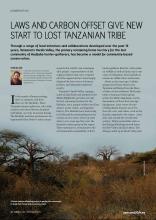Land Library
Welcome to the Land Portal Library. Explore our vast collection of open-access resources (over 74,000) including reports, journal articles, research papers, peer-reviewed publications, legal documents, videos and much more.
/ library resources
Showing items 1 through 9 of 13.In the Mekong region, conflicts between local communities and large scale land concessions are widespread. They are often difficult to solve.
The NGO Forum on Cambodia, in cooperation with the Ministry of Agriculture, Forests and Fisheries, organized a national consultation workshop on 19-20 December 2016 on the sixth version of the draft Cambodian Agricultural Land Law.
The « Environment and Natural Resources Code of Cambodia » (Sixth Draft – – 20 November 2016) is a very extensive proposed law (535 pages !) which will have, if adopted, major impacts on many aspects of Cambodian development (Mines, Energy, Urban planning, etc..) but is particularly important for
This short thematic study challenges the assumption that the legal framework to recognize and protect indigenous peoples’ (IP) customary lands is adequate and that the challenge lies in its implementation.
This short thematic study challenges the assumption that the legal framework to recognize and protect indigenous peoples’ (IP) customary lands is adequate and that the challenge lies in its implementation.
In the Mekong region, conflicts between local communities and large scale land concessions are widespread. They are often difficult to solve.
Pastoralist and hunter-gatherer communities in Tanzania are gaining rights to own and control their land as the foundation for generating new income through REDD+
Through a range of local initiatives and collaborations developed over the past 15 years, Tanzania’s Yaeda Valley, the primary remaining home territory for the last community of Hadzabe hunter-gatherers, has become a model for community-based conservation.
In this publication two pioneering grassroots organisations from northern Tanzania examine and present their experiences and insights from their long-term work to secure the land rights of hunter-gatherer and pastoral communities.









